Resonate: Go Green or Go Home Round Table
At a recent roundtable held by Resonate and hosted by Rawside, a panel of industry experts talked about navigating Sustainability in the furniture industry and the challenges, collaborations, and future directions therein. Pernille Bonser, CEO of Resonate led a lively and soul-searching debate.
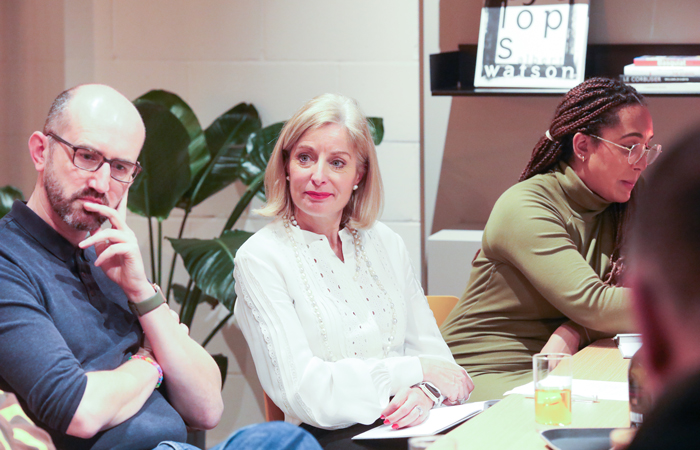
Pernille Bonser, CEO of Resonate
Beginning the discussion on sustainability in the first of a series of talks held by Resonate Interiors, this one at Rawside’s Shoreditch showroom was a look at some of the difficulties faced when sourcing recycled materials.
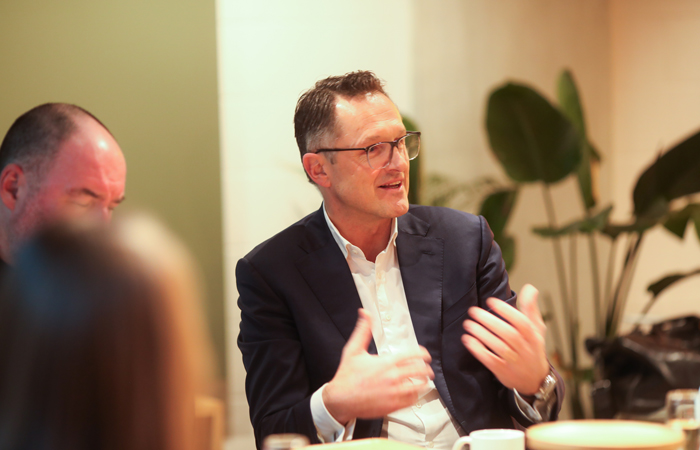
Ketil Årdal, CEO with Mater
Says Ketil Årdal, CEO with Mater, a firm started in Copenhagen in 2006, which produces furniture, lighting and objects all with sustainability at its core:
“For us, it’s actually quite specific: we source raw materials from resource waste streams. We take a fibre which can be coffee grounds, which can be replaced with a new textile waste product and extended with a binder. We have experimented a good deal in this way. The waste which we use today is much more expensive than virgin plastic, so you’re caught between wanting sustainability and circularity, but your input material, at least for us now, is actually more costly. You have to deliver quality because it has to be the lead, but you also have to be price competitive. The good news is that when it comes to pricing competitively, we are most successful.”
Liz Gann, Director with Rawside adds:
“Our raw materials include recovered wood which ties in with our strong sustainability ethic and imperative. There is a lot of drive for people to have greater levels of sustainability for lower prices. There’s a constant battle between achieving the sustainability that everybody wants to specify on their projects and the price that’s constantly being driven down. Also, with something like one of a kind, heritage materials, we don’t have the same ability to say ‘yes’.”
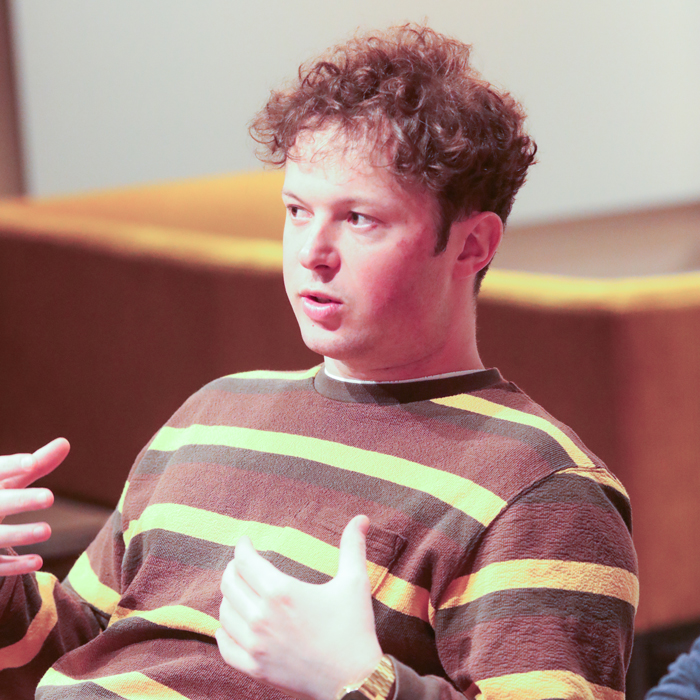
Archie Cross, Rawside
Her colleague Archie Cross adds:
“We don’t go through a third-party for our source material. We have to bring it in ourselves. It’s about putting the time and effort into finding the materials. If someone specifies a material that isn’t sustainable, we must challenge that and suggest an alternative one of out of standard materials.” As far as people being willing to pay extra for sustainable products, Tony Antoniou, Managing Director with Rainbow Office Furniture and Design says, “large corporations tend to lead the way and then the SMEs will follow afterwards.”
Resonate CEO Pernille Bonser who chaired the discussion added:
“I do find one of the challenges that I’m sure is common to everyone around this table, is people’s understanding of sustainability. There are a lot of different views on what makes a product sustainable and there’s also lots of different certifications. It can be a bit of a minefield in terms of the numerous different measurements that are in place.”
Liz Gann adds:
“We have conversations as to what is the information that people want and can we give it to them without getting it certified at huge cost when it might not be the information people want in 6 months’ time.”
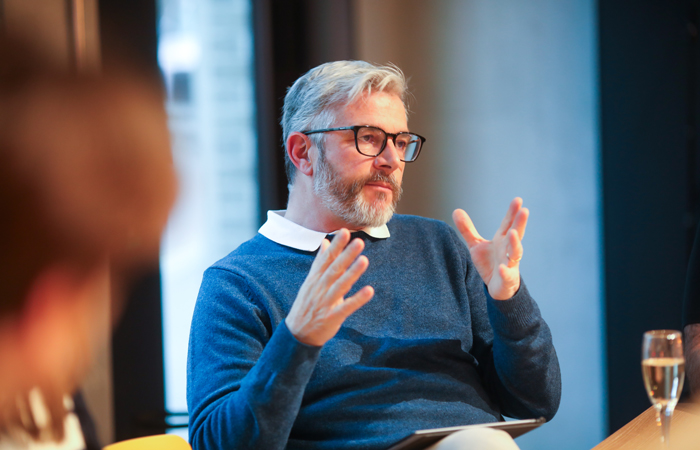
Tony Antoniou, Founder & MD of Rainbow
Says Tony Antoniou;
“It’s crying out for a governing body because there are too many certificates, and you end up jumping through hoops to get all the information requested. It’s a case of having to justify a particular product but you don’t know which certificates are going to be specified.”
Ketil Årdal agrees;
“It’s the same in Scandinavia, you measure the carbon but then the next project requires knowledge of something different. We need a not for profit to simplify and say, ‘this is how we judge furniture sustainably’. The current situation creates a lot of frustration from our side and across Europe.”
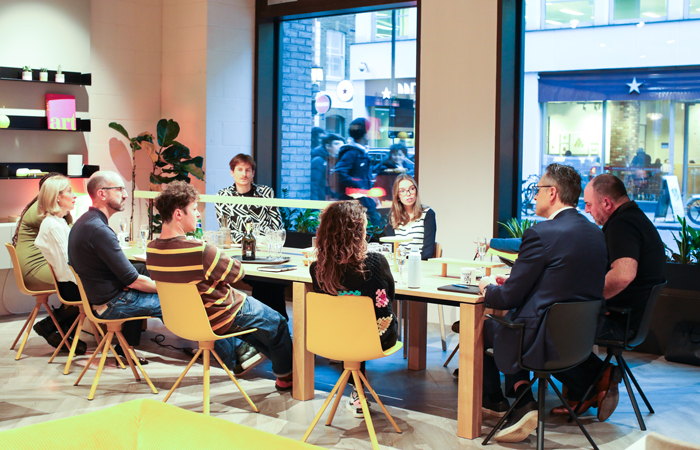
Mark Brear, Senior Associate Designer at Resonate advocates using older furniture or newer products that incorporate older elements. Repurposing furniture in this way is of course a great way to reduce the carbon footprint of the stakeholders involved but there is an increasing need for more collaboration and education as well as the aforementioned standardisation within the industry. Says Rainbow’s Darren Ronan:
“There was a project where we reused furniture. If you talk to the QS then it’s always an option and indeed it should always be a viable option. The cost savings could be in their thousands.”
Rawside’s Archie Cross says:
“We are seeing more and more projects reusing desk bases, which is a big saving. The money saved on reuse can be spent on choosing more sustainable materials on new products.”
He adds that it’s not just the furniture itself that needs to be considered;
“But also the energy we use, packaging and logistics. We create briquettes to heat the workshop, so we don’t have any gas and we have solar panels. As a furniture manufacturer you do use a lot of energy and we need to continue to develop the way we do things and think about the social impact too.”
Jakob Kunst, Project Designer with Resonate agrees that it’s important to understand the holistic story around the product, “which includes energy input.”
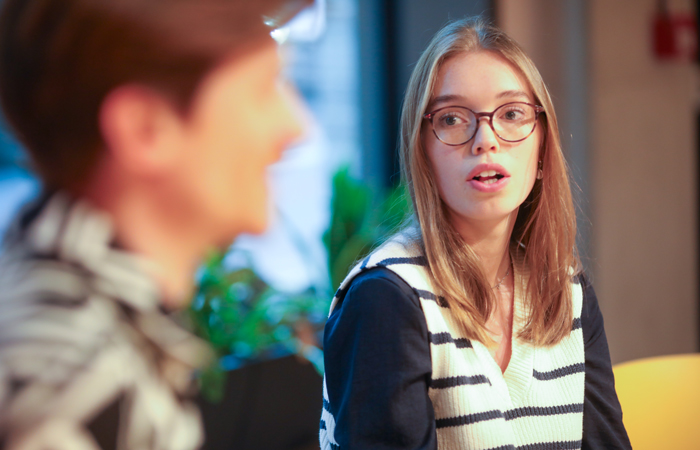
Venetia Flint, Sustainability Co-Ordinator & Fitwel Ambassador
And as for whether it’s Resonate’s job to educate its clients, Venetia Flint, Sustainability Co-Ordinator & Fitwel Ambassador says:
“There’s so much information and scientific jargon out there, we need to bring it back to basics. After all it’s a relatively new topic for so many people.”
Her colleague Lannekka Iloka, Project Designer with Resonate adds;
“Personally I think I need to educate myself more before I can actually hand on heart say whether a product, I’m specifying is sustainable or not. I do think we need to gently nudge our clients in the right direction which isn’t always easy as creating the right aesthetic can come into play too, something which is part of our job.”
Overall, the speakers advocate for a more realistic approach to sustainability in product design and manufacturing, providing alternatives and educating clients on sustainable options, even if it means deviating from their original visions. The conversation underscored the importance of continuous learning, transparency, and collaboration in advancing sustainability efforts in the furniture industry.




